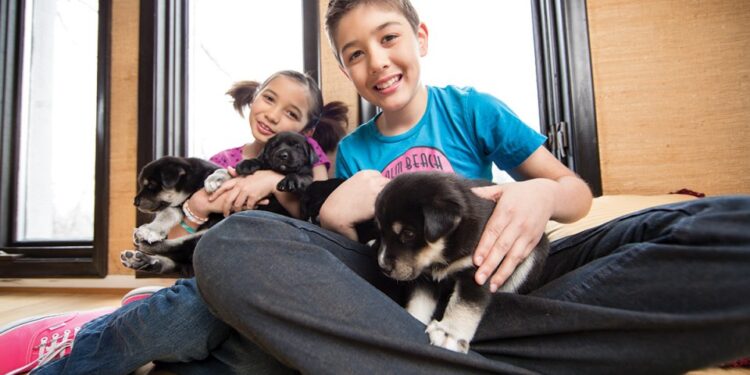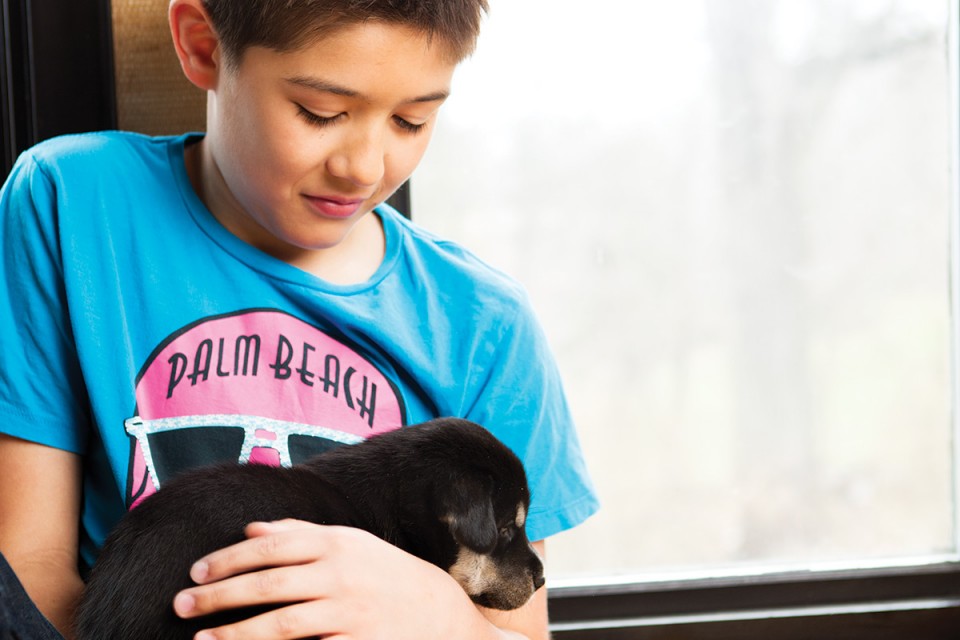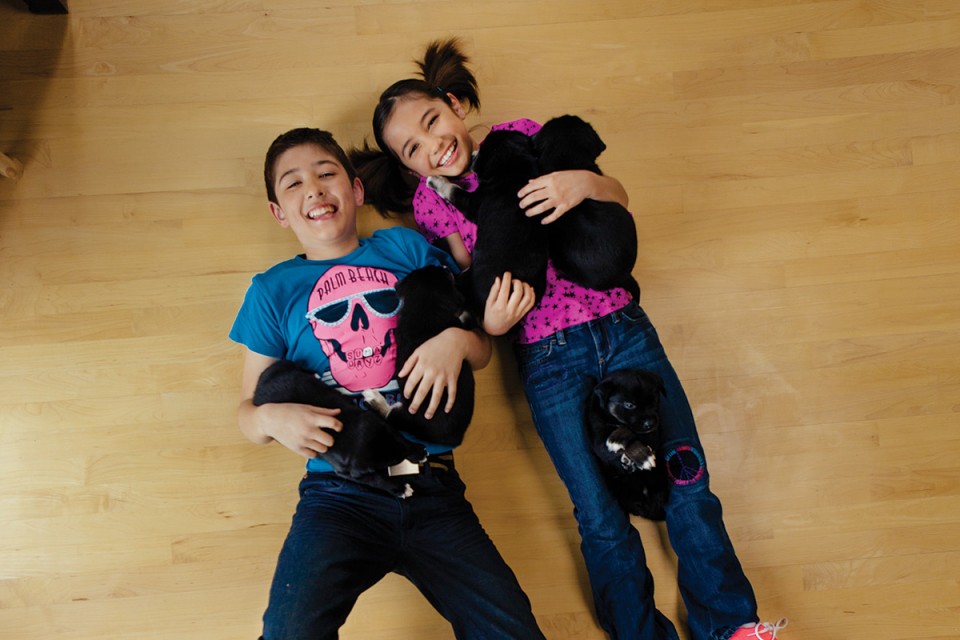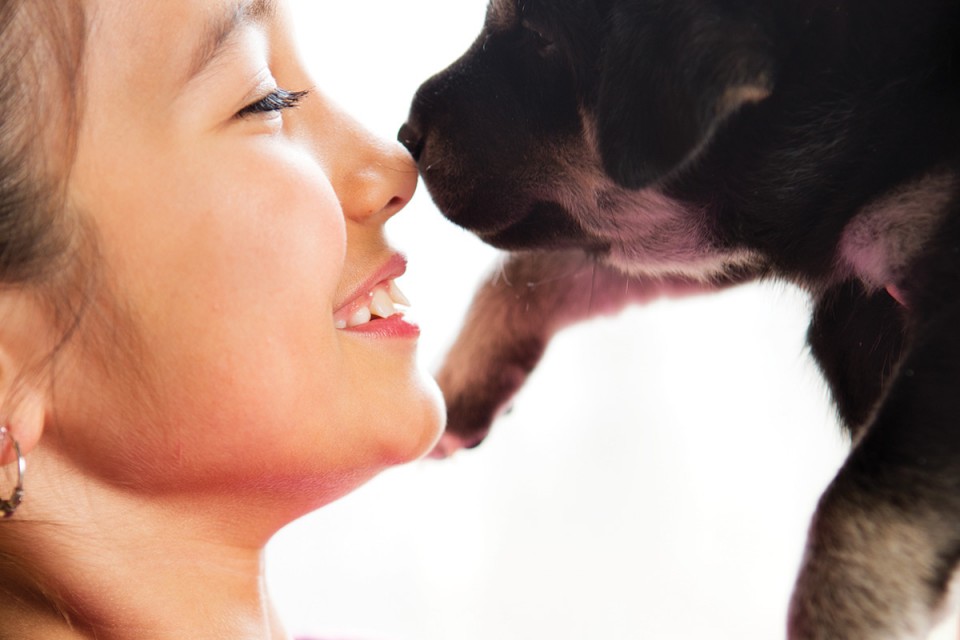So you just had kids. During the first couple years of raising toddlers, you were under a lot of stress and had a fairly unpredictable schedule. But now that they’re in school, you’ve gotten into a comfortable routine—breakfast, take the kids to school, go to work, pick the kids up from school, eat dinner, go to bed. It’s about this time that you might be thinking, “Hey, we should get a family pet!”
But how do you know if a pet is a good idea? And what kind of pet should you get to fit your family’s lifestyle? Well, there are actually several things to consider before adding a pet to your family.
The first is whether or not you have time you can devote to a pet. “Time is the best judge,” says Cathy Guinane, training and behavior coordinator with the Nebraska Humane Society, who works with owners of new pets regularly. “A family has to have time for an animal. They can’t be gone all the time.”
Guinane, herself, adopted four dogs—three terrier mixes and one poodle mix—and personally prefers to get pets in the summer. “It’s easier to potty-train a puppy or younger dog when the weather is nice. [And] more people are outside in the summer, so there’s more time for walks.”
“The answer is different for each family,” adds Tera Bruegger, director and adoption coordinator with Hearts United for Animals, a no-kill shelter, sanctuary, and animal welfare organization in Auburn, Neb. “One time that can be difficult, however, is around the holidays.” Bruegger says that holiday preparations, leaving town, and constantly having guests over aren’t beneficial to the transition of adding a pet to the family because there’s not enough time to establish a routine.
“A lot of thought and discussion should go into this life-changing decision,” explains Bruegger. Feeding, grooming, exercise, medical expenses, your home—all of these things must be considered before taking on a new pet.
Always evaluate your home before getting a pet. Do you have a house or a condo that you’ve bought, or are you renting an apartment?
If you have a permanent residence, you’re in pretty good shape. (If you have a yard, that’s even better, especially if you’re thinking about getting a dog.) You’ll just have to get used to the idea of your pet possibly destroying wood floors and carpet, scratching doors and cabinetry, and chewing furniture. But hey, you’ve had kids. You’ve already accepted the fact that your house will show some wear and tear, right?
If you’re renting, however, you’ll want to check with your landlord because you might not be allowed to have a pet; and if you are, there are often breed and weight restrictions, as well as pet deposits and monthly fees. Apartments are getting a lot better about allowing pets, but adopting a giant Great Dane might be better if you held off until you have a permanent residence.
The big one, though, is whether or not you can afford to own a pet. Purchasing and adopting both cost at least a couple hundred dollars, depending on the breed and age. Then, there’s spaying and neutering, which are highly recommended by vets. Don’t forget licensing, rabies shots, and annual check-ups and vaccines. And just like kids, always keep in mind that there could be a medical emergency, like a broken leg.
So what kind of pet is best for your family? Well, that depends on your schedule and whether or not you’re looking for a long-term companion for your family.
Smaller animals—fish, birds, reptiles, rodents—require much less time, space, and interaction than a cat or dog. “They’re good for teaching kids responsibility,” says Guinane. In fact, if you’re not sure about whether your family is ready to handle the responsibility of a larger pet, it might be good to start with one of these. Beware, though. These pets have shorter lifespans and may upset younger kids when they die.
With a cat or dog, more time and effort is needed. Both animals crave interaction, whether it’s a walk around the neighborhood, playing with toys, or simple petting.
Cats are the more independent of the two, explains Guinane. Although they do still need some attention, cats won’t feel the same sense of abandonment a dog will if your family is out of the house a lot. Cats do, however, require a litter box (unless you train your cat to go outside or in the toilet), which will need to be cleaned on a regular basis. Also, most cats don’t do well with roughhousing.
“If you’re looking for a quieter pet that is fairly easy to take care of, cats can make great companions,” says Bruegger.
On the other hand, dogs are very playful and make great family companions. “A dog will love everyone and can handle the activities of an active household,” says Guinane. Not to mention, if you have children who are physically disabled, a dog can provide extra support.
“Dogs can bring so much happiness to a home,” Bruegger adds. “Some people believe you live longer with dogs, as you are happier, and you may be healthier since you may get more exercise walking the dog.”
Age is also something to think about with cats and dogs. Kittens and puppies are fragile and require training, but they’re also much more social. “They can grow up with the kids and the activity of the household,” says Guinane. The problem? “They get into everything and chew a lot!”
With an older cat or dog, you have the luxury of only having to train the animal to get used to your home, as they already know basic commands and are potty-trained. “They may be a bit more laid-back or have less energy, which can be appealing to many people,” explains Bruegger. Just make sure you choose an older pet wisely because some of them may not have been around kids before. Usually, animals that haven’t been around small kids find them frightening because their movements are so fast and unpredictable, which can be especially hard on an older animal.
“[An older animal] may also have more health issues,” adds Guinane. “They may not be as game to play and be touched when they don’t feel well.”
Nevertheless, whatever type and age of animal you choose for your new family pet, both Guinane and Bruegger recommend that you adopt from a shelter or rescue instead of going to a pet store.
“Animals at shelters need a home,” says Guinane. “Sometimes, they just need another chance.” The Nebraska Humane Society works closely with people looking to adopt and tries to find the best possible match, depending on personality types, lifestyle, and location restraints.
Hearts United for Animals has a similar process, though they take it a step farther by doing a home visit before selecting matches. “Adopting from a shelter or rescue means you’re not supporting puppy mills [with] inhumane conditions…For many, the thought of providing a home to an animal that needs one fills their hearts with joy, and the bond built with a rescue pet can be second to none.”
















